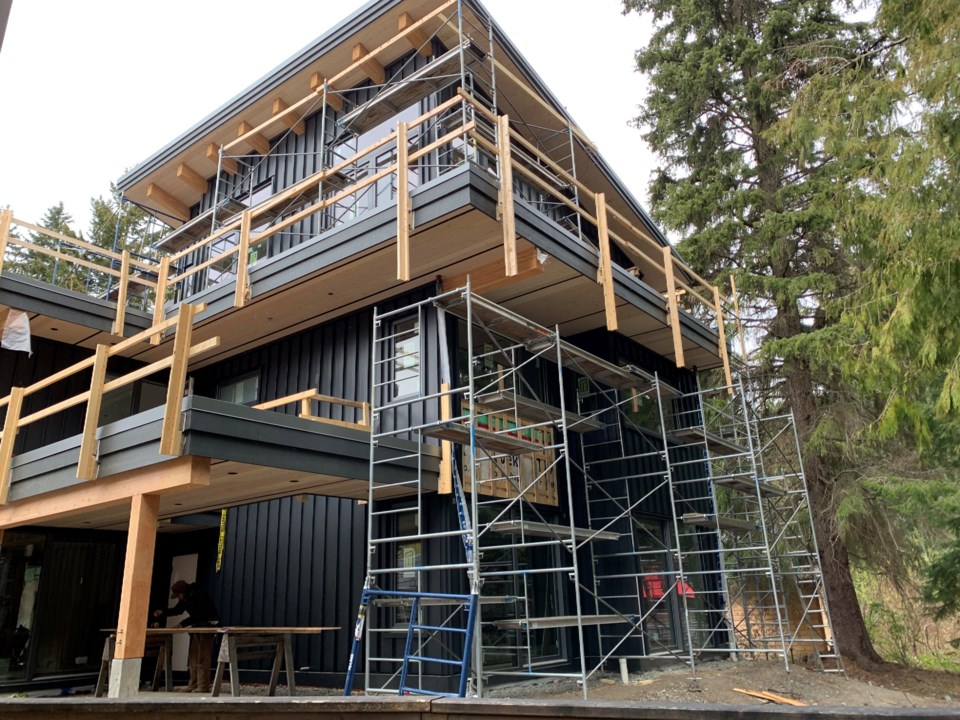Areas for bike parking, increased building material recycling, parking lots with ample electric vehicle charging stations and eliminating potable water use for irrigation are just some of the highlights from the Resort Municipality of Whistler’s (RMOW) newly adopted Green Building Policy.
On Dec. 6, Whistler’s mayor and council officially adopted the new 36-page policy, which sets a range of performance requirements and new guidelines for building in the resort—all of which will have widespread implications for new developments in the municipality.
“The Green Building Policy is a guiding document that clarifies the RMOW’s sustainability and green building framework. It provides guidance to property owners, developers and designers and will help us deliver on our climate action promises,” RMOW planner John Chapman said in a presentation to council.
“The policy proposes a flexible, performance-based approach addressing design, construction and operation of new construction, looking at multi-family buildings, commercial and industrial buildings, and large, single-family dwellings.”
According to Chapman, the 2008 Green Building Policy became outdated over the last 14 years, with requirements and standards that are outdated and no longer relevant. The updated policy aims to address changes to technology practices, design, and sustainability goals.
The RMOW’s Big Moves Climate Action Strategy and Official Community Plan (OCP) identified the policy update as a major priority to lower Whistler’s emissions.
Currently, energy use in building operations accounts for about 40 per cent of the community’s total emissions, including heating, cooling, appliances, and lighting. The remainder comes from fossil fuel single-occupancy vehicle transportation.
New requirements for builders in Whistler
The new building guidelines are grouped thematically into six sections: energy and emissions; building materials; sustainable site design; green mobility; water conservation and rainwater management; and solid waste.
Under the updated policy, builders must submit a completed checklist and “sustainability narrative” describing how the project addresses each section of the policy as a condition for rezoning.
The checklist system under the new policy is a more streamlined approach that simplifies the process by centralizing all recommendations and requirements into one list rather than the several utilized under the 2008 policy. The RMOW hopes the simplification will help improve permitting times, which have seen a backlog over the last few months.
“The Green Building Policy provides clear, simplified submission requirements with a single checklist that details submission requirements for supporting documents, technical reports with up-to-date guidelines and a single checklist, RMOW planner Louis- Félix Tremblay-Renaud said in a presentation to council.
“The updated policy will be easier for both applicants and our building staff. This should lead to improved processing timelines and require fewer staff hours to administer.”
A step above
The new policy most affects developments requiring rezoning applications, as the RMOW seeks to create a zero-emission municipality with some of the province’s most ambitious green building requirements.
For example, all new buildings going through rezoning must commit to building one step higher than Whistler’s current Energy Step Code requirements as required by the existing building and plumbing bylaw.
New developments must also commit to incorporating a low-carbon energy system as the primary space and water heating source, and must demonstrate passive design strategies to minimize heating, cooling loads and energy use.
The policy also requires builders seeking rezoning to create detailed demolition and construction waste management plans. They must include a description of measures taken to increase recycling and diversion rates, and must meet diversion rate targets.
The policy also recommends builders use locally sourced, B.C. materials for floors, windows, doors, insulated panels, lighting, and heating where feasible.
What about Whistler's vehicle emissions?
Single-occupancy vehicles remained the most significant contributor to Whistler’s carbon emissions at 54 per cent in 2019. With that in mind, the new Green Building Policy requires all new single-family dwellings, two-family dwellings, townhouses, and single/two-family dwellings with secondary suites or lock-off units to provide a Level 2 EV charging station or higher. In non-residential developments subject to rezoning, at least 25 per cent of parking spaces must provide Level 2 charging or higher.
The policy also requires new developments to provide more space for bikes to park, requiring all new mixed-use, multi- family residential, industrial, commercial and institutional buildings subject to rezoning to provide at least six short-term bicycle parking spaces near the building entrance in
a weather-protected and well-lit area at grade. Multi-family residential developments must provide long-term bicycle parking spaces in a bicycle storage facility or within each residential dwelling unit, with at least one bike parking space required for each dwelling unit under 45 square metres and at least two for each dwelling unit greater than that.
Finally, another significant change under the updated policy is the use of water, especially as it relates to irrigation. Under the new policy, new developments subject to rezoning must eliminate potable water use for irrigation and avoid installing permanent potable water irrigation systems.
Rainwater and non-potable water irrigation systems are still allowed.
While the new policy is undoubtedly ambitious, Tremblay-Renaud believes it is key to addressing Whistler’s climate action goals.
“The Green Building Policy addresses Whistler’s climate action goals and moves us to be aligned with current leading edge practices of other communities. It implements commitments in our community vision, OCP and Big Moves Climate Action implementation plan,” Tremblay- Renaud said. “The policy also clarifies and streamlines processes for the building sector with a policy informed by industry. Staff will continue to implement green building and sustainability in Whistler with the suite of tools and authority available to us. The policy also provides a framework for ongoing review and refinement in the future.”





